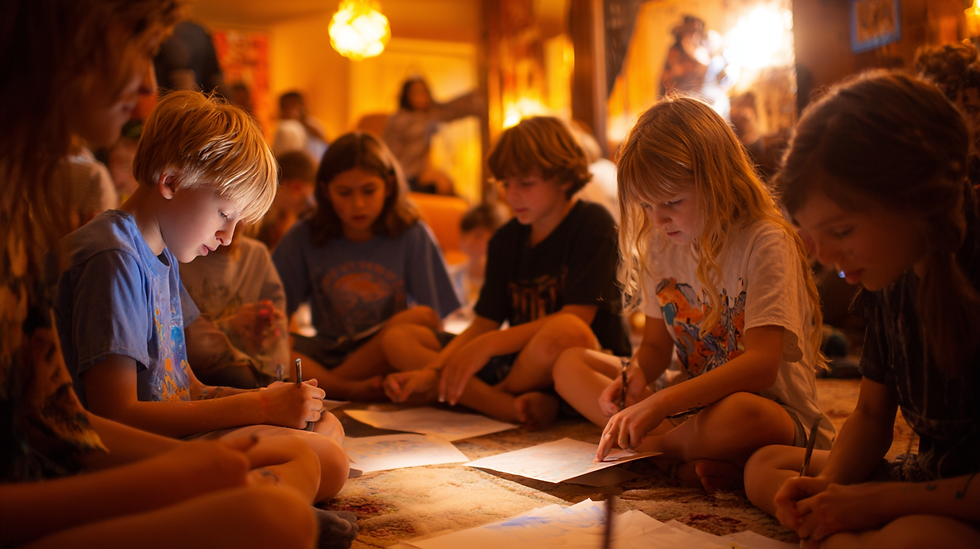Social Skills Development Activities for Kids
- Cocoon Cotton

- Jun 18, 2025
- 3 min read

Have you ever watched your child hesitate to join a group at the playground or struggle to share their favorite toy? These small moments are actually building blocks for lifelong social success. In our screen-dominated world, nurturing face-to-face social skills has become more crucial than ever for raising confident, empathetic children who can thrive in any social situation.
Why Social Skills Are Your Child's Superpower
Social skills encompass far more than just being polite—they're the foundation for communication, empathy, cooperation, and conflict resolution. According to Dr. Ellen Galinsky, author and researcher at the Families and Work Institute, "Social and emotional skills are the foundation for all learning." Research from Harvard University demonstrates that children with strong social skills are more likely to succeed academically and maintain healthier relationships throughout their lives.
These abilities aren't innate talents but learned behaviors that require consistent practice through meaningful interactions. The good news? The most effective classroom for social learning is something every child loves: play.

Age-Appropriate Social Skills Activities That Actually Work
For Younger Children (Ages 3-6): Foundation Building
Collaborative Storytelling Adventures: Create story circles where children take turns adding sentences to a shared tale. This simple activity teaches active listening, patience, and the value of everyone's contribution. Use props or dress-up clothes to make the experience more engaging and encourage creative expression.
Emotion Identification Games: Use picture cards or mirrors to help children recognize and name different feelings. This foundational skill supports emotional intelligence development, which directly improves social interactions. When children can identify their emotions, they can better communicate their needs and understand others.

For Elementary Ages (Ages 7-10): Skill Expansion
Cooperative Board Games: Move beyond competitive games to cooperative ones where players work together toward a common goal. These games teach teamwork, strategic thinking, and celebrating collective success. For age-appropriate game suggestions, check out our guide on Games for 10 Year Olds.
DIY Team Projects: Collaborative crafts and building projects naturally foster communication and compromise. When children work together on creative endeavors, they practice sharing ideas, delegating tasks, and problem-solving as a team. Our post on The Benefits of DIY Activities for Child Development offers excellent project ideas that promote social learning.

Creative Expression Meets Social Development
Art and creativity provide unique platforms for social growth. Wearable art projects encourage self-expression while creating opportunities for children to share their creations and receive positive feedback. These activities naturally reduce screen time while promoting face-to-face interactions and collaborative problem-solving.
Outdoor Group Adventures: Unstructured outdoor play offers dynamic environments for social development. Whether building forts, organizing games, or exploring nature together, children learn to navigate group dynamics and resolve conflicts organically. According to the American Academy of Pediatrics, outdoor play is essential for cognitive, physical, social, and emotional well-being (HealthyChildren.org).

Balancing Digital and Real-World Connections
While addressing screen time concerns, it's important to create intentional opportunities for face-to-face interactions. As discussed in our article on Balancing Technology and Outdoor Play for Kids, the key lies in purposeful media use that supplements rather than replaces real-world social learning.
Expert Tip: Dr. Michele Borba, educational psychologist and author, emphasizes that "Empathy is a skill, and like any skill, it can be taught and nurtured." Consistent practice across different environments—home, school, and community—creates the foundation for strong social-emotional development.
Creating the Perfect Environment for Social Growth
Successful social skills development requires comfortable, unrestricted environments where children can focus on building relationships rather than adjusting uncomfortable clothing. At Cocoon Cotton, we understand that quality children's clothing plays a crucial role in social confidence and active participation.
Our double bio-washed, 100% combed cotton garments provide exceptional softness and comfort, allowing children to move freely during collaborative activities. When kids feel comfortable in their clothing, they're more likely to engage actively in group play, express themselves creatively, and participate fully in social learning experiences. This comfort directly supports:
Enhanced creativity through unrestricted movement during imaginative play
Improved fine motor skills during hands-on collaborative activities
Reduced screen time by making active, social play more appealing
STEM education support through comfortable participation in hands-on group experiments and building projects
Quality, comfortable clothing eliminates distractions and boosts self-confidence during crucial social learning moments, setting the foundation for lifelong relationship skills.

Building Tomorrow's Leaders Today
Social skills development isn't just about making friends—it's about raising confident, empathetic individuals who can navigate our interconnected world. By incorporating these engaging activities into your child's routine and providing them with comfortable, quality clothing that supports active play, you're investing in their future success and happiness.
Discover our full range of thoughtfully designed children's clothing at Cocoon Cotton's product collection and give your child the comfort they need to develop their social superpowers.



Comments